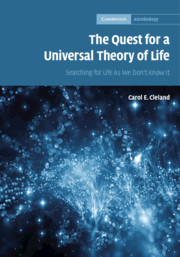Book contents
- The Quest for a Universal Theory of Life
- Reviews
- Cambridge Astrobiology
- The Quest for a Universal Theory of Life
- Copyright page
- Dedication
- Contents
- Acknowledgments
- Introduction
- 1 The Enduring Legacy of Aristotle: The Battle over Life as Self-Organization or (Genetic-Based) Reproduction
- 2 Why Life Cannot Be Defined
- 3 What Is a Scientific Theory?
- 4 How Scientific Theories Develop
- 5 Challenges for a Universal Theory of Life
- 6 Rethinking the Traditional Paradigm for Life: Lessons from the World of Microbes
- 7 Artificial Life: Could ALife Solve the N = 1N=1 Problem?
- 8 Searching for Extraterrestrial Life Without a Definition or Universal Theory of Life
- 9 A Shadow Biosphere: Alien Microbes on Earth?
- Conclusion
- References
- Index
6 - Rethinking the Traditional Paradigm for Life: Lessons from the World of Microbes
Published online by Cambridge University Press: 05 September 2019
- The Quest for a Universal Theory of Life
- Reviews
- Cambridge Astrobiology
- The Quest for a Universal Theory of Life
- Copyright page
- Dedication
- Contents
- Acknowledgments
- Introduction
- 1 The Enduring Legacy of Aristotle: The Battle over Life as Self-Organization or (Genetic-Based) Reproduction
- 2 Why Life Cannot Be Defined
- 3 What Is a Scientific Theory?
- 4 How Scientific Theories Develop
- 5 Challenges for a Universal Theory of Life
- 6 Rethinking the Traditional Paradigm for Life: Lessons from the World of Microbes
- 7 Artificial Life: Could ALife Solve the N = 1N=1 Problem?
- 8 Searching for Extraterrestrial Life Without a Definition or Universal Theory of Life
- 9 A Shadow Biosphere: Alien Microbes on Earth?
- Conclusion
- References
- Index
Summary
As discussed in Chapter 1, Aristotle divided all life into two taxonomic categories, plant and animal, a view that, as Section 5.3.2 recounts, dominated biology until less than two hundred years ago. When one considers that Aristotle’s observations were limited to what could be seen by means of unaided human vision, namely, plants, animals, and certain fungi, for example, mushrooms (which he classified as plants), this is hardly surprising. In the seventeenth century, Antonie van Leeuwenhoek, who first observed and described them under a microscope of his own devising, classified microorganisms as tiny animals (“animalcules”). It was not until the mid-nineteenth century that unicellular organisms were placed in their own (a third) taxonomic category, Protista, by Ernst Haeckel. What is surprising is how long Aristotle’s classification system survived in the face of mounting empirical evidence that unicellular organisms defy classification as plant or animal.
- Type
- Chapter
- Information
- The Quest for a Universal Theory of LifeSearching for Life As We Don't Know It, pp. 132 - 160Publisher: Cambridge University PressPrint publication year: 2019

